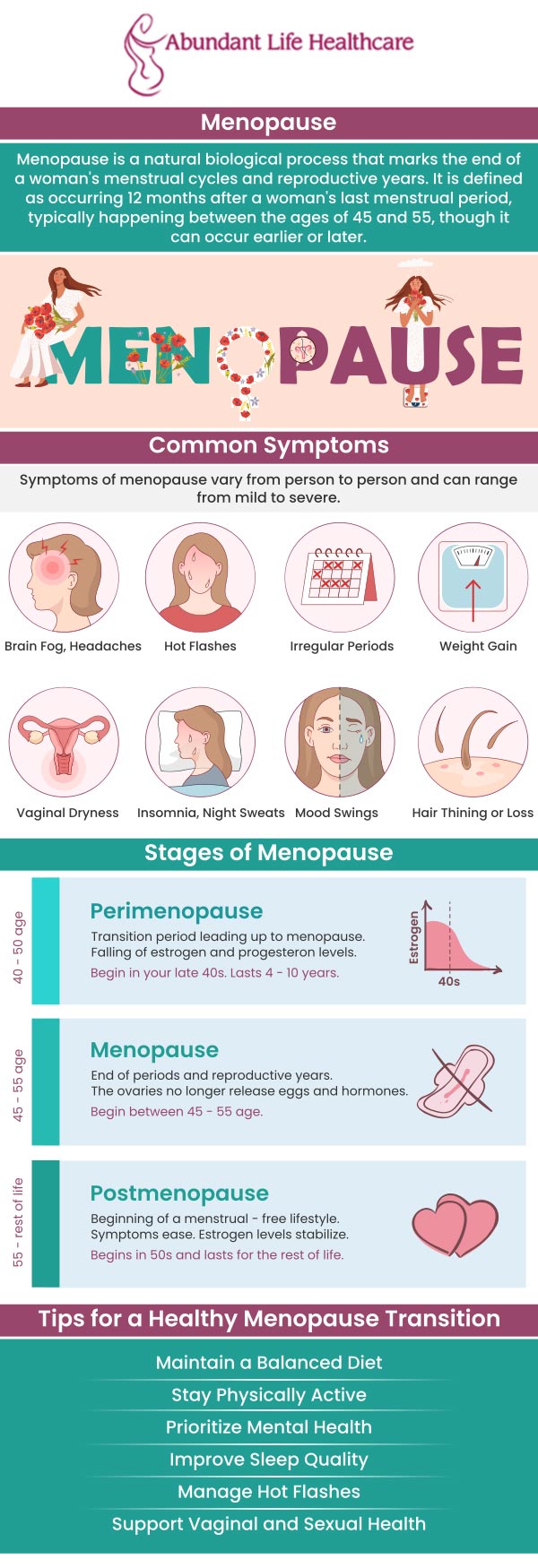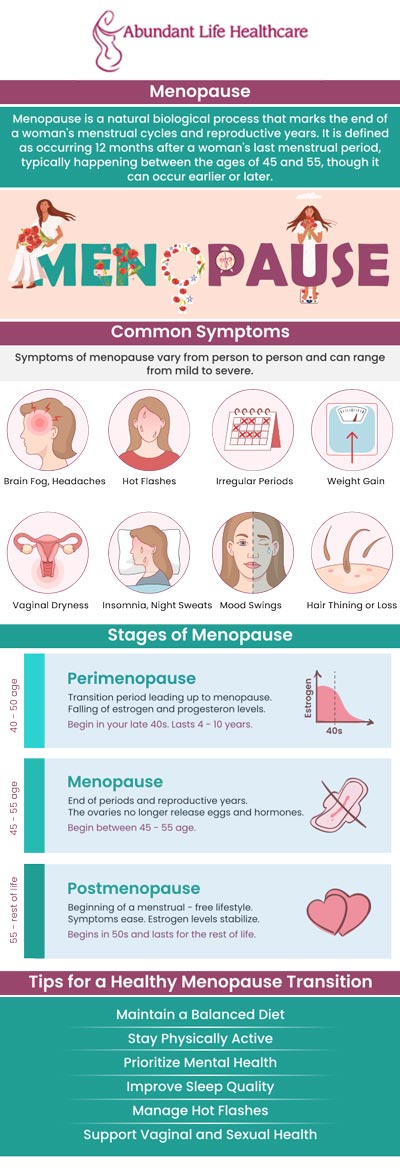Menopause Treatment Specialist Q&A
Menopause marks the end of monthly periods and is confirmed after 12 consecutive months without a menstrual cycle. Common symptoms include hot flashes, vaginal dryness, and difficulty sleeping. The combination of these symptoms may also lead to anxiety or sadness. At Abundant Life Healthcare, our board-certified OB/GYN, Dr. Marc Jean-Gilles, DO, FACOG, provides evidence-based medical treatment for all stages of menopause to help alleviate these symptoms. For more information, contact us today or book an appointment online. We are conveniently located at 601A Professional Drive, Suite 370, Lawrenceville, GA 30046.




Table of Contents:
What are the 1st signs of menopause?
What happens to a woman during menopause?
Can menopause symptoms start at 40?
How do I know if I’m in early menopause?
The first indicators of menopause vary from woman to woman. A small percentage of women experience no symptoms at all. However, the most commonly reported early symptoms of menopause include:
• Irregular periods – Menstrual cycles often become irregular, with changes in flow and duration, at the start of menopause.
• Mood swings – Fluctuations in hormone levels can cause significant mood changes. Irritability and sadness are often reported.
• Hot flashes – Sudden and intense waves of heat, often accompanied by sweating and flushing of the skin, are known as hot flashes.
• Vaginal dryness – Reduced estrogen levels often lead to dryness and discomfort in the vaginal region.
• Changes in libido – Some women experience a decrease in sexual desire as menopause begins.
• Night sweats – These are episodes of intense sweating during sleep, which lead to disrupted rest and low energy.
• Sleep difficulties – It’s common to have difficulty falling or staying asleep due to hormonal shifts.
• Weight changes – Some women notice weight gain or changes in body composition once they enter menopause.
If you are experiencing any of these symptoms and are unsure whether you are entering menopause, it’s recommended to consult a women’s health specialist for a thorough evaluation and tailored guidance.
Menopause is a natural biological process that marks the end of a woman’s reproductive years. During menopause, the ovaries gradually produce less and less estrogen and progesterone. This results in menstrual cycles becoming irregular and eventually stopping altogether. This transition typically occurs between 45 and 55, with the average age being 50.
Along with changes in menstrual patterns, women often experience various additional symptoms during menopause. These include hot flashes, mood swings, vaginal dryness, and weight changes. Some women also notice changes in their skin and hair, as well as a gradual decline in bone density. This increases their risk of osteoporosis. Moreover, menopause can affect overall health and increase heart disease and weight gain risk. Hormonal fluctuations during this life phase can lead to mood changes and feelings of anxiety and depression.
While menopause is a natural part of aging, its symptoms, and effects can vary widely among women. Some report experiencing minimal discomfort, while others find the transition more challenging. Women need to recognize and understand the changes their bodies are going through during this transitional time.
Yes, menopause symptoms can start at age 40 or even earlier. This occurrence is known as early or premature menopause. While the average age of menopause is 50, some women experience symptoms as young as their 40s or even in their late 30s. Early menopause can occur due to various factors, such as genetics, medical conditions, surgical interventions like a hysterectomy, and certain lifestyle choices.
Early menopause symptoms are similar to those experienced during regular menopause. Since early menopause has an impact on fertility and long-term health, it’s essential for women exhibiting these symptoms to consult a women’s health specialist for an assessment and effective management. If you are in your late 30s or early 40s and are experiencing menopause symptoms, it’s important not to dismiss them. Seeking medical support will provide you with valuable insights and guidance during this new phase of life.
If you are in your 30s and experiencing certain changes, you may wonder if you’re in early menopause. Early menopause can occur for various reasons and is characterized by the onset of menopause symptoms before the age of 40. Some of the signs that you are entering early menopause include an irregular menstrual cycle, night sweats or other sleep disturbances, mood swings, persistent fatigue, and vaginal dryness. If you think you are experiencing early menopause, it’s advised to seek medical evaluation for a proper diagnosis. Our team of knowledgeable women’s health specialists can assess your symptoms, conduct hormone tests, and review your medical history to determine if early menopause is the right diagnosis.
Whatever phase of menopause you are in, we want to make you feel at ease and promote your overall well-being and fitness. Menopause treatment specialists are available at Abundant Life Healthcare. For more information, contact us today or book an appointment online. We are conveniently located at 601A Professional Drive, Suite 370, Lawrenceville, GA 30046. We serve patients from Lawrenceville GA, Suwanee GA, Snellville GA, Duluth GA, Dacula GA, Lilburn GA, Loganville GA, Auburn GA, and surrounding areas.
Check Out Our 5 Star Reviews


Additional Services You May Like

Additional Services You May Like
- Obstetrics
- Pregnancy
- Gynecologist
- Birth Control
- Labiaplasty
- Microblading
- Weight Loss
- Semaglutide GLP-1
- Pap Smears
- Pelvic Pain
- Laser Hair Removal
- In House Ultrasound (Including 3D)
- Vaginal Birth After C-Section (VBAC)
- Pregnancy As High Risk
- Multiple Gestations
- Postpartum Counseling
- 24hour/365days On Call Service
- Annual Exam
- Abnormal Uterine Bleeding
- Management Of Endometriosis
- Ultrasound
- Pelvic Organ Prolapse
- Urinary Incontinence
- Perimenopause And Menopause
- Sexual Dysfunction
- Fat Freeze (Like Cool Sculpting)
- Body Contouring
- Ozempic
- Civil Surgeon
- Hormone Replacement Therapy
- Immigration Medicine
- Biote Hormone Pellets
- GLP-1
- Peptide Therapy




